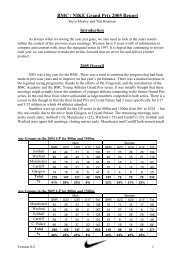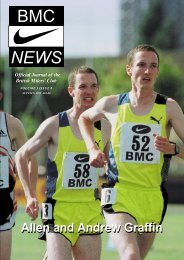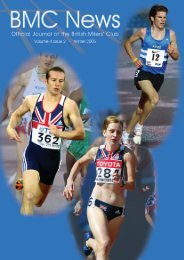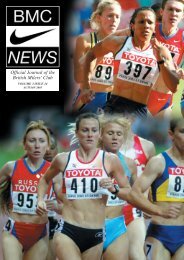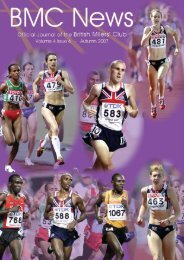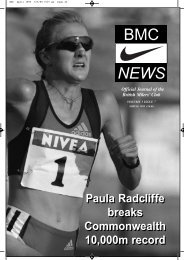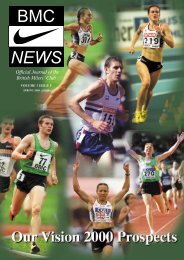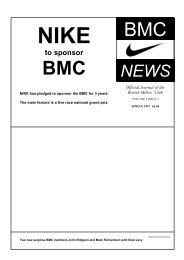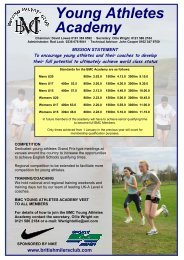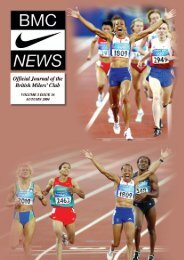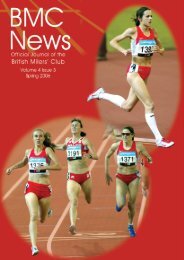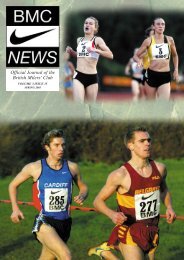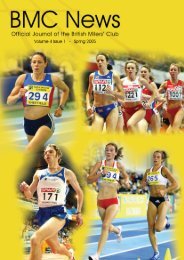BMC NEWS - British Milers Club
BMC NEWS - British Milers Club
BMC NEWS - British Milers Club
You also want an ePaper? Increase the reach of your titles
YUMPU automatically turns print PDFs into web optimized ePapers that Google loves.
Hackett on Sydney<br />
What can <strong>BMC</strong> administrators,<br />
athletes and coaches learn from an<br />
examination of the results of the<br />
Sydney Games As middle and long distance<br />
specialists, <strong>BMC</strong> members were primarily<br />
focused on the races ranging from 800m to the<br />
marathon. I have chosen to highlight two<br />
areas in this analysis, namely the age profile<br />
of medallists and the importance of prior<br />
underage success. The tables show the medal<br />
winners in each of these events in addition to<br />
their age. The statistic that will surprise most<br />
people is the age of the gold medallists in the<br />
men’s events. With the exception of<br />
Gebrselessie, the gold medallists were aged<br />
21 and 22. The fact that Gebrselessie has been<br />
winning gold medals since he was that age<br />
should be taken into account. This should<br />
make a few people sit up.<br />
Maybe we have been nursing young<br />
talented athletes along too much in the belief<br />
that time is on their side and it would be better<br />
to wait a few years before pushing them into<br />
hard training. There is more evidence further<br />
on to suggest we need to identify our talented<br />
athletes earlier and target European and World<br />
Junior Championships more vigorously.<br />
The average age of the eighteen medallists<br />
in the men's events was 25. When you<br />
consider there were two 32 year olds in that<br />
list the average age could have been lower.<br />
But it is worth noting that eight of the medallists<br />
were under 23. There is a significant<br />
difference in the age profile of the women<br />
medallists. Apart from Szabo all the gold<br />
medallists were 29 and the average age of the<br />
medallists was 29. In fact 70% of the women<br />
who medalled were aged 29 or over. This<br />
information suggests that women peak later<br />
than men, but that needs to be weighed up<br />
with the following observation.<br />
The majority of the medallists have been<br />
successful since their junior years and it seems<br />
that unless an athlete is showing potential as a<br />
teenager the odds are against him or her being<br />
successful as a senior. Nearly all of the men<br />
who medalled were finalists in their respective<br />
World Junior Championships. Three of the<br />
Olympic champions were World Junior<br />
Champions; Gebrselessie in 1992, Kosgei in<br />
1998 and Wolde in 1998. Two other gold<br />
medallists, Schumann and Ngeny were<br />
finalists at the 1996 World Juniors. Schumann<br />
won the European Juniors the following year<br />
and bear in mind that Ngeny is the world<br />
junior record holder for the mile.<br />
The World Junior Championships started in<br />
1986 so nearly all of the current olympians<br />
had the opportunity to take this stepping<br />
stone. The same trend is now appearing in<br />
women’s athletics as well. At the World<br />
Juniors in 1990, Tulu was a gold medallist and<br />
four years later Szabo was also a winner.<br />
Marathon champion, Takahashi was a finalist<br />
at the World Juniors as was Ribero. Ribero is<br />
an Olympic champion from Atlanta and she<br />
took bronze in Sydney. Sonia O Sullivan<br />
competed in a World Junior Championship<br />
but she didn’t make a final. However, she was<br />
showing signs of things to come when as a<br />
teenager she won the Irish National Senior<br />
Cross-Country Championships. Four years<br />
later she was a World Student Games<br />
champion. A title also won by Szabo. Wami is<br />
another who has been winning championships<br />
since she was a teenager. It is worth noting<br />
that Paula Radcliffe was a World Junior Cross<br />
Country champion.<br />
So what are the implications of these<br />
statistics for <strong>British</strong> and Irish athletics In the<br />
long term, thinking about the 2008 Olympics;<br />
those responsible for developing talent in<br />
middle and long distance events need to<br />
identify talented 14-16 year olds and prepare<br />
them thoroughly for World and European<br />
Junior Championships. The evidence is strong<br />
that an athlete needs to have performed at top<br />
level as a junior if he or she is to be a medallist<br />
as a senior. This has been the trend with most<br />
prominent middle and long distance athletes.<br />
Of course there will be exceptions to this<br />
trend. Kelly Holmes was a late developer but<br />
remember women have time on their side.<br />
The second point to bear in mind is that the<br />
odds are quite high that the next Olympic<br />
finalists from these islands will have been a<br />
finalist at the 1996, 1998 or 2000 World<br />
Table 2<br />
1996 World Junior finalists<br />
800m men<br />
Tom Lerwill (silver medal)<br />
James Nolan (Irl)<br />
1998 World Junior finalists<br />
800m men 1500m men 5000m women<br />
Chris Moss Colm Mc Lean (Irl) Louise Kelly<br />
2000 World Junior finalists<br />
5000m men<br />
Mohamed Farah<br />
Chris Thompson<br />
Table 1<br />
Medal winners from the Sydney Olympic Games<br />
Name<br />
Age<br />
800m men<br />
1 Schumann 22<br />
2 Kipketer 30<br />
3 Al Geurni 26<br />
1500m men<br />
1 Ngeny 22<br />
2 El Guerrouj 27<br />
3 Lagat 26<br />
3000m s/c<br />
1 Kosgei 21<br />
2 Boit Kipketer 27<br />
3 Ezzine 22<br />
5000m men<br />
1 Wolde 21<br />
2 Saidi-Sief 22<br />
3 Lahlafi 32<br />
10,000m men<br />
1 Gebrselassie 28<br />
2 Tergat 32<br />
3 Mezegebu 22<br />
Marathon men<br />
1 Abera 22<br />
2 Wainaina 27<br />
3 Tola 26<br />
800m women<br />
1 Mutola 29<br />
2 Graf 27<br />
3 Holmes 30<br />
1500m women<br />
1 Merah-Benida 29<br />
2 Szekely 35<br />
3 Szabo 25<br />
5000m women<br />
1 Szabo 25<br />
2 O Sullivan 30<br />
3 Wami 26<br />
10,000m women<br />
1 Tulu 29<br />
2 Wami 26<br />
3 Ribero 32<br />
Marathon women<br />
1 Takahashi 29<br />
2 Simon 27<br />
3 Chepchumba 30<br />
Junior Championships. This is particularly<br />
likely in the men’s events. Of course there will<br />
be one or two exceptions who may have been<br />
injured during a year of the World Juniors or<br />
they may have had an unlucky birth date.<br />
Three who spring to mind are European<br />
Junior medallists Gareth Turnbull and Nick<br />
Andrews and Kelly Caffel who had a couple<br />
of seasons upset by injury. This list of World<br />
Junior finalists includes those in tables 1 & 2.<br />
18<br />
<strong>BMC</strong> News : Spring 2001



